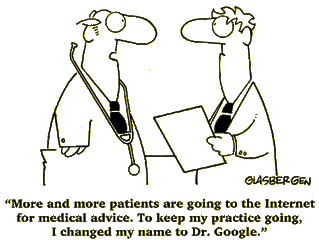
From the psychiatry stand point, as psychiatrist Anna Fels from Weill Cornell Medical College points out in the article "Do You Google Your Shrink?", the internet has led the field to change and evolve as we never would have predicted. In her article, she examines the ways in which technology has been both a help and a hindrance within the world of psychiatric medicine.
"I knew my psychiatric practice was forever changed the day a patient arrived with a manila folder stuffed with printouts and announced that it contained the contents of a Google search that he had done on me. He pulled out a photo of my mother and me, age 7, that had been published in my hometown newspaper; architectural plans for an addition to my house that was never built but apparently was registered locally by the architect; an announcement about my great-grandfather’s becoming editor of Amazing Stories magazine in his old age; and my brother’s history as a college activist...
IN some ways, the relentless electronic interconnectivity of our lives serves to highlight therapy’s singular virtues. We are more appreciative of the strange, private dialogue that is the heart of #therapy. There are precious few times and spaces left in our society in which people quietly speak to one another in a sustained, intimate conversation. The therapist’s office is one of the last safe places. Secrets, reflections, fears or confusion never leave the room."
 RSS Feed
RSS Feed
